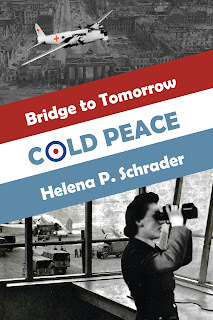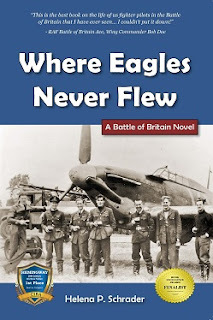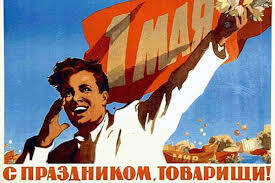BRIDGE TO TOMORROW: COLD PEACE -- Meet Karl Liebherr
Karl Liebherr is a necessary character. In a book about the Communist attempt to take control of Berlin and drive the protectors of democracy out, there has to be at least one enthusiastically Communist character.
Excerpt 1:
“How can you represent “the people” if only 10% of the populationvotes for you?” [Karl's father asked.]
“Because we are on the side of progress!”
“How does destroying our industrial capacity further progress?”The elder Liebherr wanted to know.
“The Soviets suffered immeasurably in the war. They have the rightto reparations!”
“Agreed! Even the Americans agree. The Western Allies invented the idea of reparations after the lastwar, remember? No one is questioning the right of the Soviet Union toreparations, but there must be limits — a clearpoint at which they stop. Furthermore, Germany has to have a way to pay them.” Slowing down to add emphasis to his words,Jakob Liebherr declared. “For the last two years, the Soviets havebeen systematically vandalizing or dismantling our factories, power plants,laboratories and workshops. In doing so, they have destroyed our ability tomanufacture industrial products and thereby our ability to earn the currencywith which to pay them the reparations they want.”
“Don’t be a capitalist stooge!” Karl shot back. “You are sayingthat reparations should be paid from profits. Profits are theft. The Sovietsare securing reparations by taking from the capitalists the means of production and so enabling the SovietUnion to become a great industrial nation.”
“That might have been true if the factories they dismantled here werebeing rebuilt and operated in the Soviet Union— which they are not. Furthermore, even if they did re-assemble the factories, the price would be theimpoverishment of Germany, making it perpetually dependent on hand-outs from the West.” Jakob droppedhis voice. “That, Karl, might be in the interests of the Soviet Union,but it is not in the interests of Germany or the German people.”
“Defending the Socialist Motherland is in the interests of allworking people,” Karl countered, more flustered by his father’s calm than hisearlier anger.
“That’s what they taught you in the Lubjanka, Karl. It is not yourown brain or heart speaking.” Liebherr pinned his son to his chair with hiseyes.
After several long seconds, Karl broke free. He jumped to hisfeet. “How do you know what is in my heart and brain?”
His father gazed at him unwaveringly. Karl spun about, grabbedhis coat and without bothering to put it on plunged out the door, slamming itbehind him.
One of the striking things about Berlin during the Blockade and Airlift is that the Berliners did not vote "for the banana" -- unlike what happened forty years later. When the Berlin Wall came down in 1989, the residents of East Germany turned their backs on Socialism because they wanted a higher standard of living. They wanted a Mercedes Benz (or at least a Volkswagen) rather than a Trabbi. They wanted the internationally recognized and powerful D-Mark, not their aluminum currency that was worthless on the exchange markets. They wanted Levis and Legosteins, Barbie Dolls and, yes, bananas. That they also got a well-functioning democracy with rule-of-law on top of all that was just the icing on the cake.
In contrast, Berliners in 1948/49 were willing to endur hunger and hardship for the sake of democracy. As one of the put it:
The struggle for the "hearts and minds" of Berliners that took place between 1946 and 1949 included a great deal of material bribery on the part of the Soviets. The Soviet Military Administration and their puppets the Socialist Unity Party shamelessly offered better rations, jobs and housing to those who were politically loyal. It introduced a new currency at exchange rates that were not the same for all, but beneficial to political friends and ruinous to political opponents (or anyone suspected of harboring doubts about Socialism). Yet the salient point is that this bribery did not work.It is wonderful to live in a city that prefers death to slavery, that has decided to suffer more deprivations rather than dictatorship. [Ruth Andreas-Friedrich quoted in Richard Reeve's Daring Young Men, Simon and Schuster, 2010, 178]
At the height of the Blockade when residents of West Berlin were living on rations providing just 1,600 calories a day consisting of powered potatoes, powered vegetables, powdered milk and eggs, and canned meat or fish, just 3.3% of the population registered to draw Eastern rations which offered fresh milk, fresh eggs, fresh potatoes and fresh fruits and vegetables.
Mayor Ernst Reuter expressed the position of the Berliners eloquently when he feared the Western Powers might decide to withdraw from West Berlin in exchange from Russian concessions elsewhere:
Nobody can barter us. Nobody can negotiate us. Nobody can sell us...People of the world! Do your duty and help us not just with the [Airlift] but rather with the steadfast and invincible vow to our common ideals.[Reuter's speech of 9 September 1948, translation by the author]
The Battle for Berlin of 1948-1949 was not a clash of arms or economies but of ideas. And that is the reason why at least one character in "Bridge to Tomorrow" had to express the ideas with which the Soviets tried to seduce and confuse the Berliners. Karl is that character.
Yet he isn't a marionette either. Actually he is a victim. Conscripted into the Wehrmacht as a 18 year old, he was taken prisoner on the Eastern Front. There he escaped the horrors and the death around him by embracing Communism and "drinking the cool aid" offered by his tormentors. Karl has been "brain washed" in one of the most notorious centers for torture in human history: the prison of the KGB, the Lubjanka. And sometimes, just sometimes, a flicker of emotion can undermine his devotion to the Party and Stalin.
Excerpt 2:
“Don’t go to this Assembly, Vati!” Karl ordered.
“What do you mean?” His father asked astonished. “I’m a member ofthe City Council. I voted last night on the decision that is to be debatedtoday. Of course, I must attend.”
“It’s a waste of time!” Karl countered. “By going, you only make apublic spectacle of yourself! You will be photographed by the press, andeveryone will know where you stand.”
“I’m not ashamed of where I stand, Karl.”
“This is like voting against Hitler’s Enabling Law all over again,isn’t it?” The way Karl asked the rhetorical question made it sound likesomething shameful.
Jakob, however, was proud of having voted against Hitler’sEnabling Law. “Yes,” he answered steadily. “There are many parallels, which isexactly why I intend to go.” He started for the door, but his son blocked hisway.
“Don’t you remember where your vote against Hitler’s Enabling Lawgot you?”
“Do you think I can forget two years in a ConcentrationCamp?”
“Apparently you can! And the worst of it is that you never give athought to anyone but yourself and your image! You don’t care about theconsequences of your grandstanding for Mutti and me, do you?”
“Oh, so that’s what this is all about,”Jakob scoffed. “You thinkmy public opposition to the SMAD might hurt your career in the SED. Well, I’m sorry, Karl. You’re a bigboy now. You’ll have to deal with that yourself.”
“I can! I’m not worried about myself! It’s Mutti, I worry about.You honestly don’t give a damn about what happens to her, do you? No, ofcourse, not! Just like in ’33! All you think about is your public image!”
“Karl! How dare you talk to your fatherlike that!” Trude reared up.
“Dare? It’s past time that someone stood up to him! I watched you suffer while he wasin the KZ!” Karl told his mother furiously. “I watched you cry in despair. I watched you begneighbours and relatives for help. I watched you humble yourself before theNazis and try to play ‘nicelittle Hausfrau’ in the hope—”
Trude slapped her son hard. “Stop it! I’m not proud of what I did,but you have no right to judge me!”
“I’m not judging you!” Karl shouted. “I’mtrying to stop it from happening all over again. Don’t you see? Are you bothidiots? The SMAD has issued a decree and they will enforce it. The SED willenforce it. The police will enforce it. The Red Army will enforce it. Why doyou have to go through this puppet theatre of defiance?”
“You think a meeting of the City Assembly is ‘puppet theatre’?”His father asked back. He did not raise his voice, yet he asked the questionwith acute intensity. He spoke slowly and deliberately, the apparent calm ofhis voice underlining the depth of his shock and outrage.
“What else is it?” Karl shot back unintimidated. “Such quaintinstitutions have no place in a Farmers and Workers State. The Vanguard of theProletariat knows what is best and should be obeyed without this bourgeoischarade of democracy.”
“In that case, we can at least go on record as standing up for theFour-Power Agreements that the Soviets themselves signed.”
“Why?” Karl insisted. “What difference will that make? Four-Powergovernment is dead. The Western Powers have ripped it up in favour ofprotecting the interests of their monied classes.”
Jakob refused to discuss his son’s Soviet disinformation. “Ourstand will show the world that we know what is at stake and that we care aboutliberty.”
“Vati! I’m warning you not to go!” Karl was still shouting. Hesounded enraged, but something in his tone had subtly changed. Both his parentsrecognised it. Jakob’s eyes locked with his son’s, and he saw terror in them.His son was afraid for him.
Cold Peace is Book I of the Bridge to Tomorrow Series.
Three years after WWII, Europe struggles with rationing, widespread unemployment and a growing Soviet threat. Hitler's former capital lies ruined under the joint control of wartime allies bitterly at odds. With the currency worthless, the population lives on hand-outs or turns to crime and prostitution. Deep inside the Soviet Zone of occupation, Berlin appears to be an ideal target for a communist take-over, putting the defenders of democracy on a collision course with Stalin's merciless aggression.
A Battle of Britain ace, a female air traffic controller, a concentration camp survivor and an ex-ATA woman pilot are just some of those trying to find their place in the post-war world. An air ambulance service offers a shimmer of hope, but when a Soviet fighter brings down a British passenger liner, Berlin becomes a flashpoint. The world stands poised on the brink of World War Three.

Find out more at: https://www.helenapschrader.com/bridg...
View a video teaser at: https://www.youtube.com/watch?v=JTuE7...
Previous releases include:
" MORAL FIBRE," which WON THE HEMINGWAY AWARD 2022 FOR 20TH CENTURY WARTIME FICTION and a MAINCREST MEDIA AWARD FOR MILITARY FICTION as well as being A FINALIST FOR THE BOOK EXCELLENCE AWARD 2023 IN THE CATEGORY HISTORICAL FICTION.
Riding the icy, moonlit sky,they took the war to Hitler.
Their chances of survival were less than fifty percent.
Their average age was 21.
This is the story of just one bomber pilot, his crew and the woman he loved.
It is intended as a tribute to them all.
or Barnes and Noble.
 "This is the best book on the life of us fighter pilots in the Battle of Britain that I have ever seen.... I couldn't put it down."-- RAF Battle of Britain ace, Wing Commander Bob Doe.
"This is the best book on the life of us fighter pilots in the Battle of Britain that I have ever seen.... I couldn't put it down."-- RAF Battle of Britain ace, Wing Commander Bob Doe.
Winner of a Hemingway Award for 20th Century Wartime Fiction, a Maincrest Media Award for Military Fiction and Silver in the Global Book Awards.
Find out more at: https://crossseaspress.com/where-eagles-never-flew
For more information about all my books visit: https://www.helenapschrader.com
 Disfiguring injuries, class prejudice and PTSD are the focus of three tales set in WWII by award-winning novelist Helena P. Schrader. Find out more at: https://crossseaspress.com/grounded-eagles
Disfiguring injuries, class prejudice and PTSD are the focus of three tales set in WWII by award-winning novelist Helena P. Schrader. Find out more at: https://crossseaspress.com/grounded-eagles





